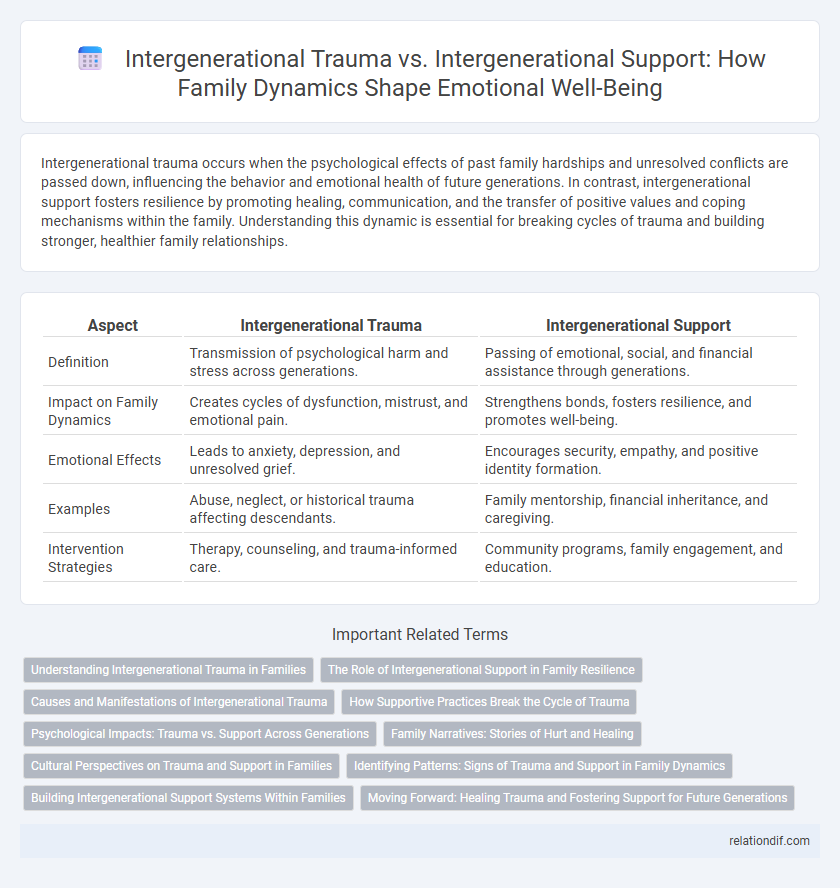Intergenerational trauma occurs when the psychological effects of past family hardships and unresolved conflicts are passed down, influencing the behavior and emotional health of future generations. In contrast, intergenerational support fosters resilience by promoting healing, communication, and the transfer of positive values and coping mechanisms within the family. Understanding this dynamic is essential for breaking cycles of trauma and building stronger, healthier family relationships.
Table of Comparison
| Aspect | Intergenerational Trauma | Intergenerational Support |
|---|---|---|
| Definition | Transmission of psychological harm and stress across generations. | Passing of emotional, social, and financial assistance through generations. |
| Impact on Family Dynamics | Creates cycles of dysfunction, mistrust, and emotional pain. | Strengthens bonds, fosters resilience, and promotes well-being. |
| Emotional Effects | Leads to anxiety, depression, and unresolved grief. | Encourages security, empathy, and positive identity formation. |
| Examples | Abuse, neglect, or historical trauma affecting descendants. | Family mentorship, financial inheritance, and caregiving. |
| Intervention Strategies | Therapy, counseling, and trauma-informed care. | Community programs, family engagement, and education. |
Understanding Intergenerational Trauma in Families
Intergenerational trauma refers to the transmission of psychological and emotional wounds from one generation to the next, often resulting from unresolved trauma experienced by ancestors. This phenomenon manifests through family behaviors, beliefs, and coping mechanisms that affect descendants' mental health and relationships. Recognizing and addressing intergenerational trauma is crucial for breaking harmful patterns and fostering healing within families.
The Role of Intergenerational Support in Family Resilience
Intergenerational support plays a critical role in family resilience by fostering emotional bonds, sharing cultural values, and providing practical assistance across generations. Such support mitigates the adverse effects of intergenerational trauma by promoting adaptive coping mechanisms and strengthening family cohesion. Research shows that families with strong intergenerational support networks exhibit higher levels of psychological well-being and resilience in the face of adversity.
Causes and Manifestations of Intergenerational Trauma
Intergenerational trauma originates from historical oppression, systemic discrimination, and unresolved psychological wounds passed down through family lines, affecting descendants' emotional and mental health. It often manifests as increased vulnerability to anxiety, depression, substance abuse, and dysfunctional relationship patterns within families. Understanding these root causes is essential to breaking the cycle and fostering intergenerational support that promotes healing and resilience.
How Supportive Practices Break the Cycle of Trauma
Supportive family practices foster emotional resilience by promoting open communication, empathy, and shared healing experiences that counteract the transmission of intergenerational trauma. Consistent nurturing environments and positive role modeling facilitate healthier coping mechanisms, reducing the likelihood of trauma-related behaviors being passed down. Evidence from psychological studies highlights that intergenerational support creates adaptive family dynamics essential for breaking cycles of trauma and promoting wellbeing across generations.
Psychological Impacts: Trauma vs. Support Across Generations
Intergenerational trauma often manifests through pervasive anxiety, depression, and behavioral issues, as unresolved psychological wounds are transmitted from one generation to the next. In contrast, intergenerational support fosters resilience, emotional stability, and healthier coping mechanisms by providing strong familial bonds and positive role models. Understanding these psychological impacts is critical for developing intervention strategies that break cycles of trauma and enhance collective well-being across families.
Family Narratives: Stories of Hurt and Healing
Family narratives reveal how intergenerational trauma transmits cycles of pain through unspoken stories and unresolved conflicts, shaping emotional patterns across generations. In contrast, intergenerational support fosters healing by preserving stories of resilience, empathy, and collective strength that empower family members to overcome adversity. These narratives form a crucial foundation for understanding the dynamics of family healing and emotional well-being.
Cultural Perspectives on Trauma and Support in Families
Cultural perspectives shape how families experience intergenerational trauma, influencing the transmission of historical pain and resilience across generations. In many Indigenous and marginalized communities, storytelling and collective rituals serve as vital methods of intergenerational support, fostering healing and cultural continuity. Recognizing these cultural frameworks highlights the importance of tailored mental health interventions that honor traditional practices while addressing trauma's long-term impact.
Identifying Patterns: Signs of Trauma and Support in Family Dynamics
Intergenerational trauma often manifests through recurring patterns of anxiety, mistrust, and emotional withdrawal within family dynamics, signaling unresolved past wounds passed down across generations. In contrast, intergenerational support is characterized by open communication, emotional resilience, and nurturing behaviors that foster healing and positive growth among family members. Recognizing these signs enables early intervention, promoting healthier relationships and breaking the cycle of trauma while reinforcing protective factors that sustain familial well-being.
Building Intergenerational Support Systems Within Families
Building intergenerational support systems within families enhances emotional resilience and fosters mutual understanding across age groups. These systems facilitate knowledge transfer, cultural preservation, and collective healing, counteracting the negative impacts of intergenerational trauma. Effective support networks promote open communication, empathy, and shared responsibilities, strengthening family bonds and long-term well-being.
Moving Forward: Healing Trauma and Fostering Support for Future Generations
Healing intergenerational trauma requires intentional practices such as open communication, empathy, and therapy to break harmful cycles embedded within families. Cultivating intergenerational support strengthens resilience by fostering trust, shared values, and emotional connections across age groups. Implementing community programs and educational initiatives promotes collective healing and prepares future generations to thrive emotionally and socially.
Intergenerational Trauma vs Intergenerational Support Infographic

 relationdif.com
relationdif.com